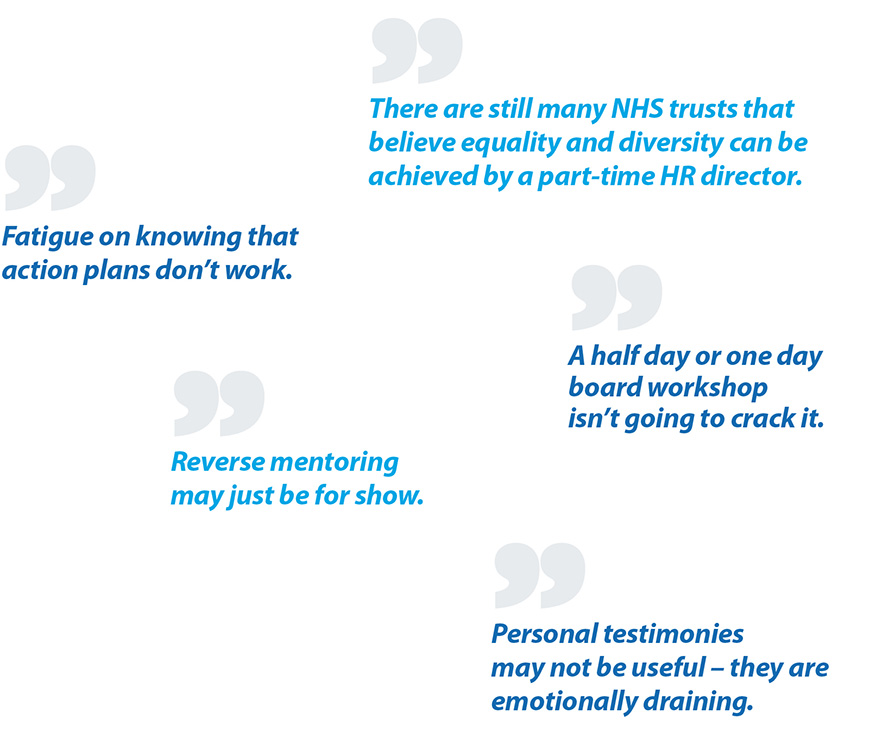1. Encourage accountability
- Identify what you are trying to achieve and how you are holding yourself and the organisation to account.
- You are accountable to the population you serve, and the workforce you lead, so seek assurance from them on whether you’re making meaningful progress.
- It is one thing to say you’ve got a “zero tolerance” approach but if there are no consequences then there is no point.
- Embed EDI into an accountability framework.
2. Education on race
- Make race education a priority to ensure people understand the external and internal context.
- Encourage people to join the dots on their own (self learning).
- Give people the literature and then challenge them.
- Tell people the session starts with the literature, so they know they must read it.
3. Foster safe spaces
- Create space for honest conversations.
- Ensure conversations are confidential.
- Find skilled facilitators. Shouldn’t always be the HR director.
- Consider external coaching, particularly for chairs, to build confidence and capability to lead on race.
4. Focus on personal values and behaviours
- White leaders taking the lead on this agenda is essential.
- Be fully committed to EDI as you cannot drive change without the support of the board.
- Recognise leadership is fundamentally about prioritisation.
- Listen to people's lived experience. Understand what it feels like to be excluded.
- Get people to express their vulnerabilities.
- Be humble and admit that you don't know everything and hold biases. Recognise and acknowledge where you haven't done well.
- Personally believe in it and role model it.
- Behaviours and actions speak volumes to colleagues from diverse communities.
5. Challenge discrimination as a priority
- Call out and challenge things that are discriminatory.
- Listen to the experiences of minority communities and the micro-aggressions that aren't called out.
- Support staff to stand up to unacceptable behaviour from patients - yellow carding demonstrations that abuse won't be tolerated.
6. Create a culture of challenging yourselves
- Where the board is not cohesive, this is a positive thing - only by understanding the core views of board members can you start to have more challenging conversations.
- Draw on external support so you have someone who can look objectively and challenge your thinking.
7. Close engagement with staff and community networks
- Staff networks are like a social movement - they can speak truth to power inside the NHS. A crucial way of checking what is going on.
- Networks give people a place to share. This is best done in specific groups i.e not all minority ethnic people experience prejudice in the same way.
- Buddy executive champions with your staff networks to help foster trust between staff and the board.
- Co-design programmes with board members and the minority ethnic network.
- Reverse mentoring - it can be a powerful with white colleagues.
- Don't just talk to staff about their live experience, talk to your communities about how they experience your services. Put them in the driving seat in how to tackle inequity.
- Link into community groups through their trusted voices and run community-based workshops.
- Do more as an anchor institution to offer employment opportunities to the most deprives communities.
8. Improve HR processes
- Look at all HR processes, recruitment and retention - embed equality, diversity and inclusion (EDI).
- Comply or explain accountability.
- Be proactive - we introduced an associate NED post on our board as a development post offered only to candidates from ethnic minority background.
- Clear policies and position on allyship, intersectionality, promoting psychological safety within the organisation.
- Positive action especially in recruitment.
- Criteria used for recruitment searches are as open as possible to encourage diverse applicants.
- Ethnic minority representative on all band 7 and above interviews.
9. Better use and understanding of data
- It is not about what you say, it is about what is found when research is done on the organisation.
- Be an evidence-based organisation which is held to account by hard data. But recognise data alone will not drive change.
- Address and make links between data and personal experiences.
- Implement systems to cut all data by different characteristics.
- Cut waiting list data by ethnicity and deprivation - do more work to discover why ethnic minorities are waiting longer.
- Look at the staff survey - recognise that one person's informal performance management conversation is another person's bullying conversation.
10. Link with health inequalities interventions
- Make tackling health inequalities a central part of any organisational strategy - the golden thread.
- Put health inequalities into the annual planning cycle.
- Provide support for the board on understanding health inequalities across the system - how to prioritise and address.
Trust leaders describe initiatives that didn't work for them:
